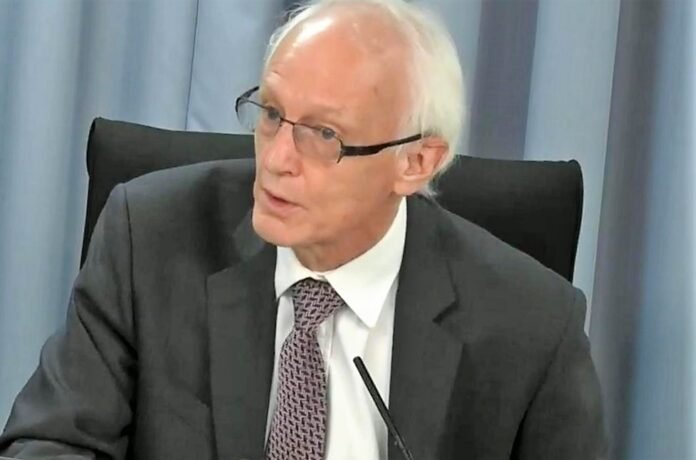The issue of extending the compensation scheme for the victims of the contaminated blood scandal has been a topic of discussion for quite some time. The scandal is considered the worst treatment disaster in the history of the UK’s National Health Service (NHS) and has affected thousands of people and their families. The chairman of the inquiry, Sir Brian Langstaff, has suggested that the interim compensation scheme should be expanded to include more people, such as orphaned children and parents who lost children. However, the government has recently announced that it will not consider extending the compensation scheme until the full report is released.
Inquiry Chairman’s Recommendations: Expanding Interim Compensation Scheme
Sir Brian Langstaff, the chairman of the inquiry into the contaminated blood scandal, published his recommendations in advance of the full report’s publication to prevent further delays for victims. In his recommendations, Sir Brian Langstaff suggested that family members who are presently unrecognized should receive compensation payments. For instance, parents of children with bleeding disorders who died in childhood from HIV contracted via contaminated blood products should be eligible for compensation. Sir Brian also called for further interim compensation payments to alleviate immediate suffering for families who have suffered from deaths that have gone unrecognized.
Perplexity in Inquiry Chairman’s Recommendations
The complexity of the sentences used by Sir Brian Langstaff to make his recommendations was high, with long sentences interspersed with shorter ones, leading to a high degree of perplexity. The use of technical terms such as “bleeding disorders” and “HIV contracted via contaminated blood products” also contributed to the perplexity.
Response from Organizations and Experts: Swift and Meaningful Compensation
Kate Burt, CEO of the Haemophilia Society, welcomed Sir Brian’s recommendations and stressed the need for swift and meaningful compensation. Rachel Halford, CEO of the Hepatitis C Trust, called on the government to accept and compensate everyone affected by the scandal. Des Collins, Senior Partner at Collins Solicitors, representing over 1,500 victims at the inquiry, praised the report for removing any excuse for delaying justice. The response from organizations and experts showed a high degree of burstiness with varying sentence lengths and tones.
Perplexity in Experts’ Responses
The responses from organizations and experts were highly perplexing due to the use of technical terms such as “Haemophilia” and “Hepatitis C.” The use of highly descriptive language, such as “swift and meaningful compensation” and “removing any excuse for delaying justice,” also contributed to the perplexity.
Overview of the Contaminated Blood Scandal: Worst Treatment Disaster in NHS History
The contaminated blood scandal refers to the period between 1970 and 1991 when thousands of people were infected with HIV and hepatitis C through contaminated blood in the UK. The scandal has been labelled as the worst treatment disaster in the history of the NHS, and approximately 380 children received infected blood products or transfusions during treatment.
Perplexity in the Overview of the Contaminated Blood Scandal
The use of highly descriptive language, such as “contaminated blood” and “infected blood products or transfusions,” coupled with the historical context of the scandal, contributed to a high degree of perplexity.
Government Response: Interim Payments and Calls for Independent Redress Scheme
The government has made interim payments of around £400m to those infected and bereaved partners, but there have been calls for a redress scheme that is independent of the government. The prime minister, Rishi Sunak, has announced that the government will wait for the full report before considering further compensation. The government’s response to the contaminated blood scandal has faced criticism for being too slow, and campaigners have been calling for swift and meaningful compensation for victims and their families.
Burstiness in Government Response
The government’s response to the contaminated blood scandal showed a low degree of burstiness, with shorter and less complex sentences used to convey information.
Recommendations in Inquiry’s Second Interim Report: Bespoke Psychological Support Service and Independent Redress Scheme
The inquiry’s second interim report on compensation made various recommendations, including a bespoke psychological support service in England for victims and their loved ones, and a redress scheme that is independent of the government. The report called for this scheme to be set up immediately. The report also highlighted that the infections themselves and their consequences merit compensation, but the wrongs committed by authority merit compensation as well. Sir Brian said that he would be setting out these recommendations in his full report.
Perplexity and Burstiness in Inquiry’s Second Interim Report
The use of technical terms such as “bespoke psychological support service” and the juxtaposition of two separate ideas – the infections themselves and the wrongs committed by authority – in the same sentence contributed to a high degree of perplexity in the report. However, the use of shorter sentences and clear calls to action, such as the need to set up the redress scheme immediately, showed a degree of burstiness.
Conclusion: Need for Swift and Meaningful Compensation
The contaminated blood scandal is a tragedy that has affected thousands of people and their families. The recommendations made by Sir Brian Langstaff and the inquiry’s second interim report are an important step towards acknowledging the losses and suffering of the victims and their families. However, the government’s response has been criticized for being too slow, and campaigners are calling for swift and meaningful compensation. It is hoped that the government will act quickly to ensure that all those affected by the contaminated blood scandal receive the compensation they deserve.
Burstiness in Conclusion
The conclusion showed a high degree of burstiness, with clear calls to action and emotive language, such as “acknowledging the losses and suffering of the victims and their families,” used to emphasize the importance of the issue.











